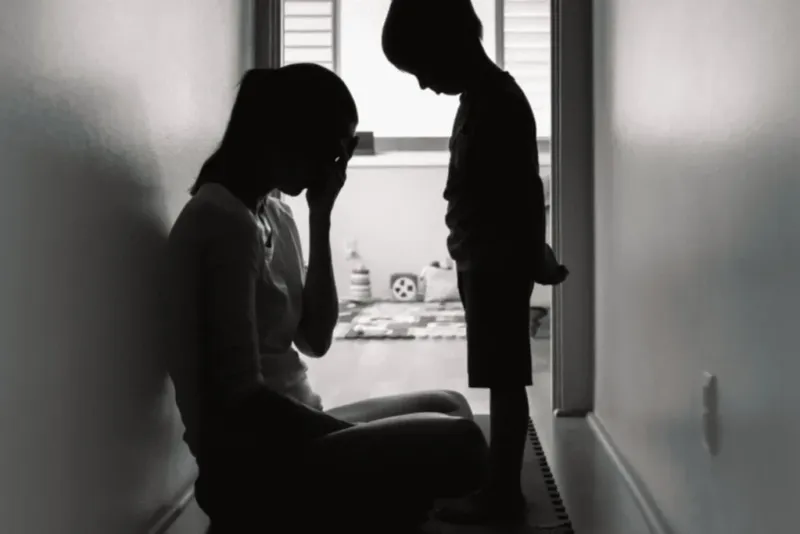Ever found yourself wide awake at 2AM, replaying something your parents said years ago—wondering if maybe you were the problem all along? Yeah. Same. Most of us have, even if we don’t admit it out loud. We laugh it off, stay busy, move on… but the ache lingers.
Because the truth is, some of the things parents say—sometimes without even thinking—can sink deep. So deep you don’t realize the damage until years later, when you’re trying to figure out who you really are… and who you were told to be.
It sneaks up on you. That quiet confusion between what was love, what was control, and what was just projection. Untangling it isn’t easy—but it’s how we start healing. Let’s talk about it.
1. “You’re too sensitive.”
“You’re too sensitive.” Heard it? It hits like a stray elbow to the gut. At first, it feels like your fault—like you missed some memo about how to act in this family. Suddenly every time you cry, get mad, or just need a minute, the voice in your head isn’t yours. It’s theirs.
You start second-guessing every gut reaction, like your feelings came with a warning label. Maybe you learned to laugh at your pain, brush off what hurts, or make yourself the joke before anyone else could. That’s not sensitivity; that’s self-protection.
Funny thing: Being sensitive isn’t a flaw. But growing up thinking it is? That can shape years of your life. You might chase numbness or settle for less, just to avoid being “too much.”
Real talk? Sensitivity is a gift—one you don’t have to apologize for. What would it look like to stop shrinking yourself to fit someone else’s comfort zone?
2. “You should have known how I would react.”
Ever get blamed for not being psychic? That’s what this line feels like. Suddenly, it’s not about what happened—it’s about how you failed to predict someone else’s blow-up.
You’re left replaying every step, wondering if you could have tiptoed better, said it differently, or just kept silent. It isn’t accountability, it’s shifting the goalposts. You start believing your job is to manage everyone’s mood, not just your own.
Being expected to anticipate someone’s reaction is exhausting. It’s control dressed up as “teachable moment.” Growing up like this, you might become hyperaware of everyone’s moods, but lose track of your own needs.
Imagine how freeing it would be to drop that weight—to let people own their reactions, good or bad. What if it wasn’t your job to preempt every storm?
3. “That’s just nonsense you read on the internet. It’s not real.”
The world opens up when you get online. Suddenly you see names for things you’ve always felt. Then, someone at home scoffs: “That’s just nonsense you read on the internet.”
It’s more than a brush-off—it’s a warning. Stop trusting your sense of discovery, stop listening to your own curiosity. The message: Only what they say counts as real.
You start doubting your sources, your judgment, even your right to explore ideas that aren’t family-approved. It’s how small worlds stay small. But knowledge shouldn’t feel dangerous. If you felt seen by a stranger’s words online, maybe they’re worth more than someone’s fear of change.
What if your questions weren’t a threat? What if you were allowed to find your own truth, even if it made others uncomfortable?
4. “It’s not that bad. Other people have it much worse.”
This one’s sneaky. It slips in as “perspective,” but it’s really a muzzle. You’re taught not to trust your own pain, because someone else’s suffering is always louder.
Instead of comfort, you get a scoreboard. Your struggles shrink, your voice withers. You start rehearsing every complaint, making it smaller before you even speak. What if your feelings were enough to matter, no matter how they stack up against the world’s worst-case scenarios?
Here’s what gets lost: empathy for yourself. Compassion isn’t a pie you run out of. There’s enough for you and for everyone else who hurts. Your pain doesn’t need to compete for airtime.
5. “You don’t really feel that way.”
Have you ever said how you felt and got told you were wrong? That’s the magic trick here. It’s not just denial—it’s rewriting your story while you’re still living it. What would change if you stopped asking for approval and trusted what you already know about your heart?
You’re left with a double burden: feeling bad, and then feeling wrong for feeling bad. That’s enough to scramble anyone’s sense of self.
Over time, you might stop sharing, or you might lose touch with your own emotions. The world feels safer when you hide. But your feelings are yours. You don’t need permission to be real.
6. “I’m worried about you. You keep forgetting things.”
Concern can be caring. But when it’s used like this, it feels like a trap. Suddenly, every mistake or misstep becomes proof that you can’t trust your own memory. “You keep forgetting things”—now you’re not just questioned, you’re doubted. It plants seeds of uncertainty, and soon you second-guess everything you remember.
It’s a slippery slope. Maybe you start writing everything down, or apologizing for things you know you did right. When someone weaponizes worry, it’s not about helping—it’s about control. Your memory doesn’t need to be perfect to be believed.
Isn’t it wild how quick concern can bend into manipulation? What would it feel like to trust your version of events first?
7. “I never said that. You must be remembering it wrong.”
There’s a weird sting to being told your memory is unreliable. The world tilts. You remember the argument, the words, the promises—clear as day. But suddenly, it’s like you dreamed it.
This line chips away at your confidence. You second-guess details, then the whole story. You start collecting proof, even for the smallest things—because you know it might come up again.
It’s a slow, steady erosion. Anyone would lose trust in themselves after enough rounds. But you don’t have to accept gaslit history as the only version. Your experiences are real. You’re not crazy for keeping your own receipts.
If your memory feels shaky, maybe it’s just tired of being challenged.
8. “You’re imagining things.”
This one can sound almost gentle. But it lands like a closed door. To be told you’re imagining things is to be told you can’t trust yourself.
It’s a way to dismiss your instincts, your gut feelings, your sense that something’s off. With enough repetition, you start wondering what’s real and what you’ve made up.
Imagination is powerful, but so is intuition. When adults use this line, it’s not about encouragement—it’s about shutting down uncomfortable truths. The world gets blurry, and sometimes you lose yourself in all that static.
What if you believed your own instincts, just once, before letting anyone else weigh in?
9. “Stop being so dramatic.”
It’s wild how “dramatic” becomes code for “too much.” Suddenly, every feeling you express is suspect—too loud, too messy, too inconvenient.
Instead of getting support, you get the message to tone it down. So, you start editing. You shrink your stories, mute your highs and lows, and play it safe.
But you’re not a movie. Life is dramatic sometimes, and that’s normal. To outgrow the “drama” label is to reclaim the right to feel out loud. What would it be like to let yourself take up space, even on your hardest days?
10. “If you really loved me, you would…”
Love is supposed to be free, but this phrase makes it transactional. Suddenly, your worth is measured by your willingness to comply. The line between real love and obligation blurs fast.
You get stuck in a loop: Do what they want, or prove you don’t love them enough. It’s weaponized affection, and it leaves deep scars. What would it feel like to give and receive it without a ledger?
Over time, you might start confusing guilt for care. You do things out of duty, not desire. The cost? Pieces of yourself left behind to keep the peace. But love isn’t a currency.
11. “You make me furious.”
Here’s the emotional hot potato—when parents hand you their rage like it’s your fault. Suddenly, you’re responsible for feelings you can’t control or fix.
It’s a heavy load. Anger becomes a weapon, and you become the scapegoat. You might stop expressing yourself, just to avoid setting someone off.
Growing up like this, you learn to walk on eggshells. But you’re not in charge of anyone else’s emotional weather. Everyone owns their own feelings, even the ugly ones. Think about this: What would happen if you stopped taking the blame for storms you didn’t start?
12. “No one else would ever love you.”
This is a cold one. It lands like a curse—a sentence to loneliness, handed down by someone who should believe in you most. The words echo long after, turning self-doubt into a soundtrack.
You start wondering if it’s true. If being loved is something you have to earn, or if you’re just fundamentally unlovable.
But here’s the secret: None of us need to qualify for love. That voice in your head isn’t the truth, just a bad recording. It’s possible to rewrite that script, even if it takes time. What would you tell a friend who felt this way? Try telling it to yourself, too.
13. “You should have known better.”
Mistakes are supposed to be how we learn, but this phrase skips the lesson and heads straight for shame. It’s a shortcut to guilt, designed to keep you small and compliant.
The hidden message: good people don’t mess up. You start anticipating blame, even for things that aren’t your fault. Perfection becomes survival, not pride.
If you’re always on edge, waiting for the next “you should have known better,” it’s not growth—it’s anxiety. Learning should feel safe. Can you let yourself try, fail, and try again, without that voice riding your shoulder?
14. “I don’t want to hear any more of your complaints. Keep it to yourself.”
Have you been told to bottle it up? This phrase is the lid. Once you hear it, you stop bringing up your hurt, your worries, your everything.
It sounds like a boundary, but it’s really a wall. You learn to keep problems private, even when they get too big to handle alone.
The cost of silence is heavy. You might look fine on the outside, but your insides are a mess. There’s courage in speaking up, even if it takes a lifetime to reclaim your voice. Your feelings deserve daylight, not just the dark.
15. “You’re just being dramatic; it’s not as bad as you’re making it out to be.”
How fast can someone shut down your story? About as fast as they can call you “dramatic.” This phrase says your pain is more about performance than reality.
You start to minimize everything—tone it down, play it cool, deny your own distress. It’s not just about hiding feelings; it’s about doubting your right to have them.
Over time, you might forget how to ask for help. The world feels safer if you pretend things don’t hurt. But your feelings aren’t up for debate. They’re valid, even when someone else refuses to see it. What would showing up, unapologetically, look like for you?
16. “You are crazy.”
The word “crazy” is thrown like a dart, meant to stick. It’s not about concern; it’s about erasing your credibility in one stroke. Suddenly, your side of the story doesn’t count.
You start over-explaining, searching for proof you’re not losing your mind. The label clings, and trust in yourself erodes a little more each time.
Everyone feels mixed up sometimes, but being called crazy turns confusion into fear. You’re not your worst moment or someone else’s insult. Trust your sanity, even when someone tried to shake it. Believe me, you are NOT crazy.
17. “You are making a big deal out of nothing.”
This phrase is the sound of your feelings getting bulldozed. What’s “nothing” to them might be massive to you. But instead of support, you get minimized.
You start to question your perspective. Should you care less? Should you just get over it? The world feels lonelier when your struggles are brushed off so easily.
Emotional invalidation isn’t a small deal—it lingers. If you’re always told your pain is “nothing,” you start hiding it, until you can’t feel it at all. The things that hurt you matter, no matter how small!


















